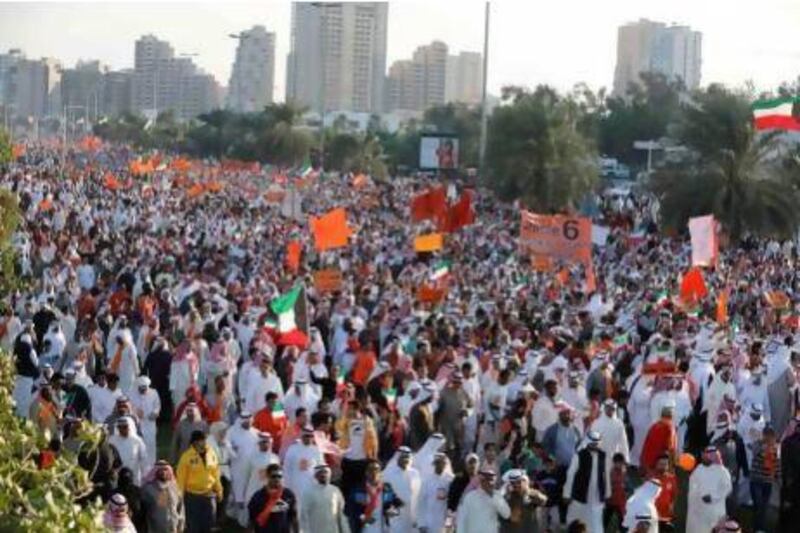KUWAIT CITY // Michelle Al Jasem and Abrar Qamber, both 20-something Kuwaitis with sharp political awareness, are worried.
In the last half-decade, they have seen their country's development stagnate compared with the UAE and Qatar. They want to catch up.
But Ms Jasem and Ms Qamber have very different ideas about the best way to do that. Ms Qamber will vote in today's parliamentary elections and Ms Jasem is one of the tens of thousands who are planning to boycott it.
As some Kuwaitis go to the polls today, a brewing political crisis has come down to this simple question: to vote or not to vote, as Kuwait Times columnist Faoud Al Obaid put it. At stake is not merely the composition of the next parliament, but the extent of future political change in the country.
Voters, many of whom support a landed merchant class that has long dominated Kuwaiti politics, argue that the existing political process - the most democratic in the region - is the only way to kick-start the country's development.
"Who's going to represent us is so important - we don't want people who just want the position and the money," said Ms Qamber, at a late night diwaniya of MP candidate Adnan Al Mutawa.
Boycotters, however, say that fundamental changes are needed in Kuwait's political system before their country can become a thriving democratic economy.
At a march that attracted one of the largest crowds ever of Kuwaitis on the eve of the election, Ms Jasem said: "We need a better government that's fair for everyone, not just the upper class."
An assortment of opposition coalitions have laid out explicit demands, calling for the legalisation of political parties and the ability for parliament to name a cabinet, currently the purview of the emir.
"In the long run our aim is constitutional reform," said Osama Al Shaheem, a former student-union activist who attended the opposition march. "We live in a strange condition: our constitution enshrines democracy but it also has undemocratic elements."
The boycott movement began in response to a decree announced by the emir last month that changed the electoral law to reduce the number of candidates for whom each person may cast a ballot. The change could reduce the opposition's share in parliament.
Under Kuwait's electoral model, 50 MPs are voted in by five districts, each district selecting 10. Prior to the decree, each voter could cast ballots for four candidates; now, they can vote for just one. The ten candidates with the most votes from each district will win seats.
Analysts have argued that under the old system, opposition candidates could form coalitions that allowed them to garner more seats, as the popular candidates were able to convince their constituents to vote for their less-popular allies. Critics of the new system also say that it may be easier for MPs to buy votes.
"One, one, one, we don't want one vote," protesters marching in Kuwait City chanted yesterday.
Now, however, the boycott candidates have essentially ensured that the parliament will be dominated by pro-government MPs, many of whom are running for the first time. Thirty-seven of the 50 elected parliamentarians from the latest assembly are not running for seats this time around.
Boycott campaigners say they hope that a turnout of 30 per cent would undermine the legitimacy of the new assembly.
"After the election our demands will continue," said former opposition MP Faisal Al Muslam.
But the emir has already set an ambitious schedule for the new parliament, which he plans to convene on December 11. Last week, he ruled out the body taking holiday before the coming summer.
"The boycotters are trying to agitate and find differences between Kuwaitis, and we are trying to prove we are united," said a former MP, Adnan Al Mutawa, who is contesting the election. "The opposition has less support than they think."
Still, analysts argue that it may prove difficult for a new parliament to function without the boycotters. A massive coalition of youth activists, Islamists, tribal politicians and liberals have banded together around a distaste for changes in the electoral law, frustration with corruption, and a desire for what they say is political dignity.
The youth are particularly capable of keeping the pressure on the government. Technologically savvy, energised by changes in the region, and endlessly determined, it is these young organisers who have brought tens of thousands to the streets several times over the past months.
Experts say that in this societal conflict, today's elections are just the next iteration. Political wrangling and possibly more protests are likely to follow.
"Our expectation is that the crisis is just beginning," said Ali Al Diqbasi, an opposition supporter and speaker of the Arab Inter-Parliamentary Union. "We hope with wisdom we can exit quickly and save ourselves the trouble.





